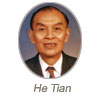AWARDEE OF MEDICAL SCIENCES AND MATERIA MEDICA PRIZE
TANG XICAN
Tang Xican, a specialist in neuropharmacology, was born in December 1932 in Chaoyang County, Guangdong Province. He graduated from the Department of Biology, Beijing University in 1957, and since then he has been doing research at the Department of Pharmacology,Shanghai Institute of Materia Medica, Chinese Academy of Sciences. He is now a professor in pharmacology and dissertation supervisor for Ph.D. student. In 2001 he was elected the academician of Chinese Academy of Engineering . During 1987 to 1991, as a visiting scholar he worked at the Institute National de la sante et de la Recherche Medical (INSERM U.288) in France, Southern Illinois University, School of Medicine and Loyola University Chicago, Stritch School of Medicine in the United States where he carried out a study on the pharmacological mechanism of huperzine A, a novel acetyl cholinesterase inhibitor mainly discovered at his laboratory, in cooperation with foreign pharmacologists.
Since 1978 he lead his research group to carry out a project in search for neuroactive principles from Chinese medicinal plants in cooperation with phytochemists. His research group has got a series of creative scientific and technological achievements, several active principles have successfully been developed as new drugs for the treatment of chronic pain, myasthenia gravis or Alzheimers disease. Prof. Tang has made important contributions to the discovery and the studies on the action mechanism of huperzine A. His research group found that huperzine A possesses the ability to protect cell against hydrogen peroxide,β-amyloid protein, glutamate, ischemia and staurosporine-induced cytotoxicity and apoptosis. These protective effects are related to its ability to attenuate oxidative stress, regulate the expression of apoptotic proteins——Bcl-2, Bax, P53 and Caspase-3, protect mitochondria, and interfere with APP metabolism. These studies revealed that the rapeutic effects of huperzine A on Alzheimers disease or vascular dementia are probably exerted via a multi-target mechanism. Attributing to his achievements on the studies of huperzine A, prof. Tang was invited to give presentation at a number of international conferences.
As a principle investigator, Prof. Tang was awarded the second-class prize, of National New Industrial Product in 1964; the third-class prize of National Invention in 1982 and 1985, respectively; the second-class prize of National Invention in 1987; the second-class and third-class prizes of National Advanced Science and Technology in 2004 and 1987, respectively; the second-class prize of National Natural Science in 2001. He was conferred as a Shanghai Labour Model in 2000. He has published 142 paper in domestic and international core journals to date. He has also supervised 16 postgraduate students to gain their master degree or doctoral degree, as well as educated 2 postdoctors.






